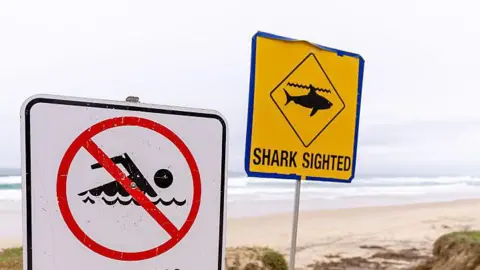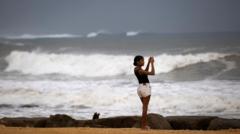A tourist in the Turks and Caicos Islands was bitten by a shark while trying to capture a photo of the animal in shallow waters at a local beach. The incident occurred on February 7, prompting immediate medical attention and an evacuation from Providenciales, a popular destination known for its vibrant coral reefs and clear waters. The local government disclosed the event on February 15, noting that the tourist had been treated in a hospital before leaving the island.
The shark involved was reported to be approximately six feet long, though officials were unable to determine its species. According to the Department of Environment and Coastal Resources in Turks and Caicos, the individual had taken the initiative to interact with the shark while attempting to snap photographs, which ultimately led to her being bitten. Despite the beach's temporary closure following the incident, it reopened two days later after the shark was confirmed to have moved into deeper waters.
Experts emphasize that shark bites are infrequent and are largely the result of misidentification. Gavin Naylor, the director of the International Shark Attack File at the University of Florida, remarked that assessing whether a bite is provoked or unprovoked can be complicated immediately following the event. He acknowledged a previous case in the Turks and Caicos last year, which also did not result in fatalities.
Chris Stefanou, a New York-based fisherman and conservationist, suggested that the tourist's phone could have been mistaken for a reflection of bait fish, which lures sharks closer to shore. "Sharks, or any predatory animal in the ocean, can confuse that as like a bait fish," he stated, explaining that sharks are unlikely to view humans solely as prey.
Interestingly, on the same day that the tourist was bitten in the Turks and Caicos, two Americans were also injured in a separate shark encounter in the Bahamas’ Bimini Bay, an incident reported by the Royal Bahamas Police Force. Naylor noted that having two shark bites in one day in the Caribbean region is unusual, yet he refrained from making any definitive conclusions regarding potential trends based on limited data.
According to the International Shark Attack File, there were a total of 88 confirmed or suspected shark bites reported globally last year, a notable decline from previous years, with the count of unprovoked bites specifically decreasing from 69 to 47. Despite the dip in numbers, the message remains clear: while shark interactions can be thrilling, they carry inherent risks that warrant caution.


















